The Psycho-Semantico Moxie of Metaphorical Drives in Advert Texting
Keywords:
advertising, metaphor, cognitive approach, attitudes.Abstract
This paper investigates metaphorical usages in advertising from a psycho-semantic perspective. It argues that metaphor is employed in advertising texts deliberately to conceptualize one concept in terms of another which has well-defined and structured experience-able effect. Semantically, one semantic domain is expanded to another in a process of simulation to the targeted concept. Usually, source domain is concrete so it can be extended semantically to paste some well-selected plausible associative meanings on the target domain. All is meant for manipulating attitudes: affective, cognitive, and behavioral on the benefit of the advertising campaign. Intentionally, metaphorical expressions are to map unpredictable yet meaningful imagistic textuality of adverts. In most cases relational and sentential innovations are supportive and additives in the process of texting meant for persuasive functions in specific and for interactive quest in general. However, conceptual metaphor is highly loaded with mentalistic drives of conceptualization and reformulation of perceptive iconic images. Thus, by manipulating and emulating attitudinal modes, advert texting can be modulated to submit a crux of mentalistic moot, conscious and unconscious, of the portrayed textuality of the adverts. Per se, adverts' texting is dependent on the observability, of the linguisticity of texts and on the persuasiveness motifs of the discoursal matching.
Downloads
Published
Issue
Section
License
Copyright (c) 2024 Prof. Rafi' Mahmood Hussein

This work is licensed under a Creative Commons Attribution 4.0 International License.
Submission declaration
Authors retain the copyright to their work and grant the Pakistan Review of Social Sciences (PRSS) the right of first publication under a Creative Commons Attribution 4.0 International (CC BY 4.0) license. This license allows others to share, adapt, and reuse the work for any purpose, including commercial use, as long as appropriate credit is given to the original authors and the journal.
By submitting a manuscript, authors confirm that the work has not been published previously (except as an abstract, lecture, or academic thesis), is not under review elsewhere, and has been approved by all authors and relevant authorities. Once accepted, the article will be openly accessible under the CC BY 4.0 license, ensuring wide dissemination and reuse with proper attribution.






